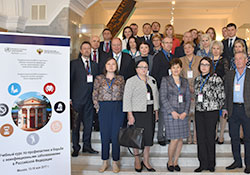Training course on prevention and control of NCDs for decision-makers in the Russian Federation

WHO
Twenty-two decision-makers from 7 regions of the Russian Federation participated in the WHO training course on prevention and control of noncommunicable diseases (NCDs) in the Russian Federation. The 4-day course took place on 15–18 May 2017 in Moscow.
WHO/Europe organized the course with the support of the Ministry of Health of the Russian Federation. They worked in collaboration with the WHO Collaborating Centre for Training and Education of Health Policy-makers on Prevention and Control of NCDs, I.M. Sechenov First Moscow State Medical University, and the WHO Collaborating Centre on Development and Implementation of NCD Prevention Policy and Programmes at the National Research Centre on Preventive Medicine of the Russian Ministry of Health.
The training aimed to increase the capacity of regional policy-makers to develop and implement multisectoral plans for the prevention and control of NCDs within entities of the Russian Federation, taking into account international recommendations and approaches.
The intensive technical programme covered key topics such as the burden of NCDs and their risk factors, prevention and control programmes, multisectoral approaches, financial aspects of interventions, and cooperation. Trainers delivered the content in an interactive way through moderated and round-table discussions and group-work sessions.
By the end of the course, participants had elaborated and presented regional NCD plans with the view of integrating them into local governmental programmes.
The participants represented various governmental sectors, including health, finance, economic development, education, protection of children’s rights, sport, and protection of consumer rights and human welfare.
Their feedback on the training was very positive. As Mr Eroshenko, Deputy Minister of Health of Rostov Oblast, mentioned, “We often attend different refresher courses and we were aware that we would deal with prevention. But within the framework of this course, we first heard of a global and international position, and the view on this topic. The training is interesting because it’s not just about lectures, but also lively communication and practical work.”
Overall, the participants expressed enthusiasm for the new knowledge and approaches, and were eager to apply them in their work.



